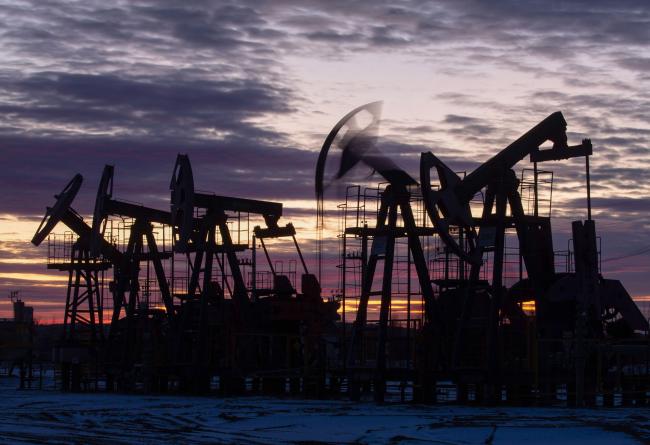(Bloomberg) -- After failed talks exposed a dangerous fissure at the alliance’s core, OPEC and its partners are quietly working to repair the damage.
Key players in the 23-nation alliance are making diplomatic efforts to resolve a dispute -- centered around Saudi Arabia and the United Arab Emirates -- over how much crude to pump in the new year. They need to thrash out a compromise before ministers gather on Thursday, at a meeting that’s been postponed because of the impasse.
The Organization of Petroleum Exporting Countries and its partners rescued the oil market this year from an unprecedented slump, slashing production as the pandemic crushed demand. If their pact breaks down, prices would sink again, battering an industry that spans tiny nations like Gabon to corporate giants such as Exxon Mobil Corp (NYSE:XOM).
On Monday, differences between the Saudis and the UAE prevented the cartel from reaching a clear agreement on whether to delay a planned production increase. Traditionally stalwart allies, a fissure has emerged between the two Persian Gulf exporters as Abu Dhabi pursues a more independent oil policy.
Delegates spent Tuesday consulting with their governments and exchanging ideas over the phone. For now, the results are hidden within the opaque world of Middle East diplomacy, but several delegates said on Wednesday that the consultations had so far been positive.
“OPEC+ often generates drama, and this time tensions are running high,” said Helima Croft, chief commodities strategist at RBC. “But we still believe that the group will probably find some face-saving compromise, with a short extension of the current cuts being the most likely outcome.”
Most nations at Monday’s online session favored deferring the 1.9 million-barrel daily supply increase due to take effect in January by three months. With a new wave of virus infections hitting the global economy, they believe demand is still too fragile to absorb additional crude.
But the UAE pushed back, delegates said. Without openly opposing a delay, Energy Minister Suhail Al-Mazrouei insisted on stringent conditions -- mainly the speedy implementation of cuts that other members owed in compensation for pumping too much in prior months -- that rendered an agreement all but impossible.
In an apparent gesture of frustration, Saudi Arabia’s Energy Minister Prince Abdulaziz bin Salman told the group that he may resign as co-chair of a key OPEC+ panel. Al Mazrouei was offered the post, but refused, according to a person familiar with the situation.
“The market is underestimating a little bit how serious this is -- this is one of Saudi Arabia’s biggest allies,” Amrita Sen, co-founder of consultant Energy Aspects Ltd., told Bloomberg Television. She didn’t predict a messy outcome this week, but sees tensions persisting into next year.
Deeper Grievances
This procedural dispute masks the UAE’s deeper dissatisfaction with OPEC supply restrictions, which “does not bode well for collective cohesion in 2021,” according to Croft.
Over the summer, Abu Dhabi’s impatience led it to cast aside its usual obedience to cartel discipline, and pump more crude than its quota allowed. The Saudis were furious, and summoned Al-Mazrouei to Riyadh for a public dressing down.
While the UAE subsequently atoned, people familiar with its oil policy say Abu Dhabi believes the current quota is unfair, and is keen to make the most of massive investments in production capacity. It’s also planning a new regional price benchmark based around its Murban crude variety, which needs the kind of volumes that clash with production limits.
Two weeks ago, the Emiratis even signaled privately that they have contemplated leaving OPEC in the long term. Analysts consider it just the latest example of the increasingly autonomous policy framework pursued by Abu Dhabi Crown Prince Mohammed bin Zayed.
“The UAE is increasingly willing to act in its own direct national interests, and where that doesn’t align with Saudi Arabia it’s confident and willing to go it alone,” said Neil Quilliam, associate fellow in the Middle East and North Africa program at the Chatham House think tank.
Nonetheless, many oil-watchers expect an agreement will be reached on Thursday. Algerian Oil Minister Abdelmadjid Attar, who currently holds the post of OPEC president, told state radio on Tuesday that postponing the meeting shows the group is willing to find a consensus.
OPEC is no stranger to difficult meetings. The gathering in April that resulted in the current output agreement went on for several days as Mexico haggled over its contribution. In 1986, one round of talks in Geneva ran for 17 days, and was quickly followed by a 10-day marathon.
“There is a determined push by the UAE to have its voice heard, to rearrange the chairs and thereby undermine Saudi primacy,” said Bill Farren-Price, a director at research firm Enverus. Still, he expects a rollover will be agreed: “They will be looking at a big dip in prices if they don’t do this.”
(Updates with comment on latest talks in fifth paragraph.)
©2020 Bloomberg L.P.

